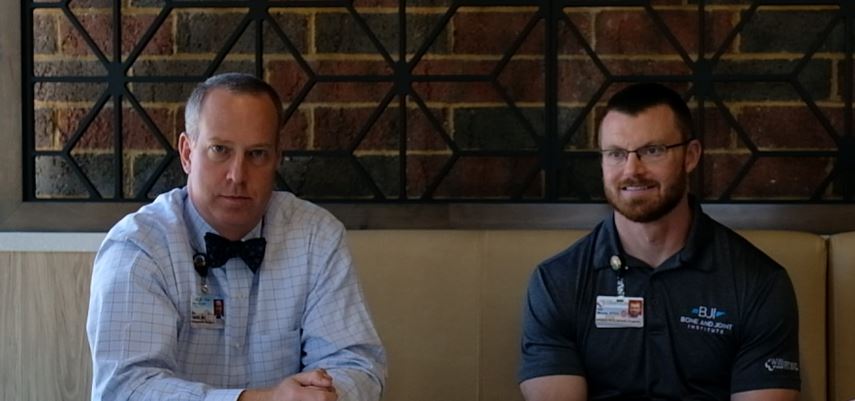Call Us: 615-791-2630
Sports Concussion Q&A With Dr. Fiechtl and Jay Moore

The Bone and Joint Institute of Tennessee’s sports medicine specialist Jim Fiechtl, M.D., and Williamson Medical Center’s director of Athletic Training Jay Moore recently sat down to answer questions from the community about sports concussions.
Q: WHAT CAUSES A SPORTS CONCUSSION?
Fiechtl: A sports concussion is caused by some sort of force that has been applied to the brain. So, it doesn’t necessarily have to be a direct hit, but can be caused by a rotational component, like a quick turn. This force creates a lot of signal changes in the brain. The signal changes are very similar to what happens with migraines or seizures, in that the signal gets spread around the brain. A concussion is really a software-type issue, if you think about it, rather than a hardware issue. It’s how signals are sent in the brain, not really the structure of the brain.
Q: WHAT CAN YOU DO TO PREVENT A SPORTS CONCUSSION?
Moore: There’s no real way to prevent a concussion, but there are some steps that coaches and teams have taken to help lower the incidence of concussions. Coaches are teaching different tackling techniques, like the head-out technique, and are cutting down on live-hitting in practices. Companies are making definite advancements with helmets as well and have improved the design to better protect the brain. There’s been a lot of progress in helping to protect our athletes, but there’s no way to truly prevent a concussion, unfortunately.
Q: WHAT ARE SOME OF THE COMMON SIGNS AND SYMPTOMS THAT AN ATHLETE MAY HAVE A CONCUSSION?
Fiechtl: What we’re looking for initially, even while they’re still on the field, is that the kids go back to the right huddle, that they line up the right way, they’re not grabbing their heads, and they’re getting off the ground fairly well. Once they come over to the sideline, the most common symptom is a headache. About 90% of athletes who have a concussion will have a headache. So not all concussions have a headache, but the vast majority do.
Interestingly enough, very few people, only about 10%, actually get knocked out when they get a concussion. So the argument that “I wasn’t knocked out, so it’s not a concussion” doesn’t really hold true. Other symptoms we look for include nausea, confusion and any behavior that’s abnormal.
Q: WHEN AN ATHLETE GETS A CONCUSSION, WHEN IS IT SAFE FOR THEM TO GO BACK TO PRACTICES OR GAMES?
Moore: Dr. Fiechtl has been great in getting a great protocol in place for us. We want to make sure that all of the athlete’s symptoms are gone before we let them return to play. Once those symptoms are completely gone, we have a return-to-play protocol we put these athletes through that lasts several days. Once they complete that, then we feel like it’s safe for them to go return to play again.
Fiechtl: I would just add one thing to add to that. If there’s a suspected concussion on the field, that kid is done for the day. So, if there’s a concern for a concussion, your athlete is done for the day.
Q: WHAT IS THE RECOVERY PROCESS LIKE FOR AN ATHLETE WHO’S BEEN DIAGNOSED WITH A CONCUSSION?
Fiechtl: We have some rough averages for how long symptoms last, but I’d say about 90% of the kids are clear at three weeks. There’s very few that make it into the miserable minority who have longer symptoms. Younger kids, because their brains are still developing and are more active, take a little bit longer. On average for middle school kids, they have about 14 days of symptoms, compared to high school kids which last about 10 days, and then most college kids have symptoms that last five or six days. We also want to make sure kids are back in school first. You have to be ready to learn before you can be ready to play. We want to make sure that they’re back in school and doing well. Once symptoms clear and kids are back in school, that’s when we start the return-to-play protocol.
Q: WHEN SHOULD A PARENT BRING AN ATHLETE IN FOR CONCUSSION TESTING?
Moore: If there’s a parent who suspects their child has a concussion, as soon as they can get them in, the better. There are some major symptoms to look for, including really bad headache, vomiting and any abnormal personality changes. If your child has those, we want you to go to the emergency room immediately and get checked out to make sure it’s not something more serious. If they don’t have those severe symptoms, we would recommend pulling them from a game or practice and bringing them to see us either that day or the next day.
All of our high schools in Williamson County have a full-time athletic trainer there, and if they suspect a concussion, they will reach out to the parent, talk to the coach, and make sure everyone is communicated with. They will also help set up an appointment to make sure we take care of that athlete and get them in to see a physician. In any case, they will absolutely be pulled from a game or practice and won’t return that day until they see a physician and get checked, like Dr. Fiechtl said. If they do have a concussion, we start our return-to-play process.
